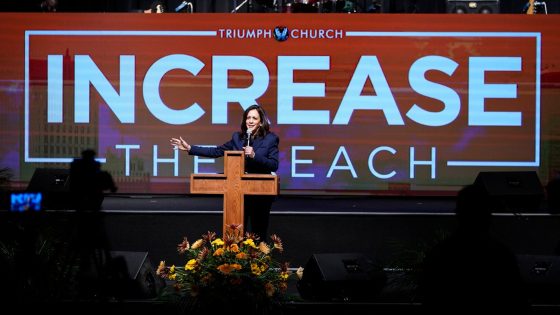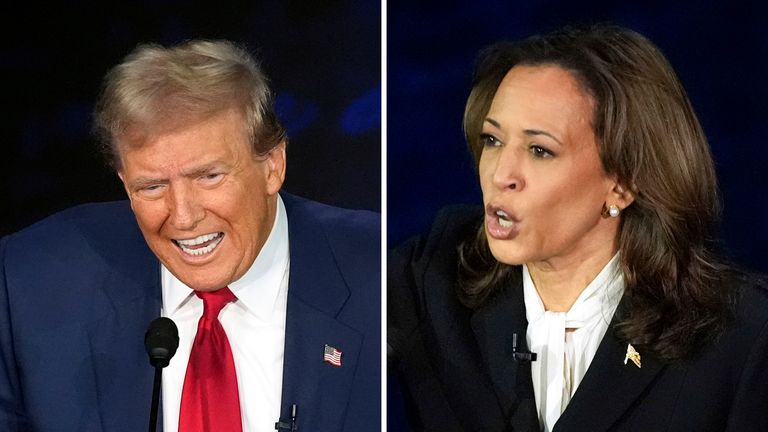America is one of the most religious countries in the West. About two-thirds of its voters identify as Christian.
But – things are changing and the nation has become less devout in the last few decades.
So how will this affect the polls in the 2024 presidential elections?
How religious is America?
We may think that faith communities are strong in the US – but religion is actually declining.
In the 1990s around 90% of Americans identified as Christian. Now more than a quarter say they have no religion.
This is significant to the election because 70% of non-religious voters in America are more likely to vote Democrat, according to a Pew Research Survey from April this year. The alignment is even stronger for agnostics (78%) and atheists (84%).
But religion is not fading across the whole of America. In some states, like Oklahoma, Arkansas, Mississippi, Louisiana and Alabama – essentially the Bible belt of America – it’s actually getting stronger.
And American Christians, including Protestants and Catholics, are generally more likely to align themselves with the Republican Party.
But race plays a significant part – 84% of Black protestants and 60% of Hispanic Catholics are more likely to vote for the Democrats.
So while they’re making gains in some less religious states, they’re also losing voters in other more conservative parts of the country.
This is key when looking at the swing states.
Religion and the swing states
In the 2020 US election, seven US states were won by less than three percentage points – a very tight margin that could change this year.
These states were: Arizona, Georgia, Michigan, Pennsylvania, Wisconsin, North Carolina and Nevada.
These were mostly won by Joe Biden in 2020 – apart from North Carolina, which Donald Trump won.
However, in the 2016 election, Mr Trump won all of these states – apart from Nevada.
So which way are they likely to swing now?
If we look at changes from the 2010 to the 2020 Census, Michigan, Wisconsin, Pennsylvania and Georgia are trending less religious. While North Carolina, Nevada, and Arizona became more religious.
If we go with the rough trend that less religious states are more likely to vote for the Democrats and more religious states are more likely to vote for the Republicans, this gives the Democrats the edge in four of the seven swing states – with Republicans winning only three.
But as you can see from the split – not to mention the other factors at play – it’s a really tight battle for the swing states, and therefore the White House.
What about abortion?
In June 2022 the US Supreme Court overturned the constitutional right to abortion, known as the Roe v Wade ruling, leaving the decision to individual states.
As a result, 14 of the 50 US states banned abortion at all stages of pregnancy with very limited exceptions. Four have banned it past roughly six weeks of pregnancy.
Underpinning the ban is the belief among some religious people that human life begins at conception and that unborn children have a right to life.
While the new ruling was celebrated by many Republicans and Christian conservatives who wanted to ban abortion nationwide, opinion polls show that the majority of Americans actually support abortion access.
Democratic nominee Kamala Harris has come out in strong support of abortion rights across the country.
While Republican nominee Mr Trump appointed three of the six US Supreme Court justices who helped overturn Roe v Wade back in 2022, he is softening his stance on harsh abortion bans – perhaps because of that polling.
In August, he told an NBC reporter that he thought Florida’s six-week abortion ban was “too short”, adding: “I believe in exceptions for life of the mother, incest, rape.”
Israel and Gaza policy
American evangelicals have solidly supported Israel’s response to the Hamas attack since 7 October last year.
This is partly because of the Bible. In 2017, a LifeWay poll found that 80% of US evangelical Christians believe that the creation of Israel in 1948 was a fulfilment of the biblical prophecy.
That’s despite the fact the US public is pretty divided on Israel’s conduct in the war.
And in Michigan, a swing state where there is a large Arab American population, some American Muslims are particularly disappointed with the current administration’s stance on the war.
Both Ms Harris and Mr Trump have stated their ongoing support for Israel in this war. Ms Harris has pledged she’ll push for a ceasefire deal, while Mr Trump says he urged Benjamin Netanyahu to “stop the killing” – in his words.
Read more:
Harris takes aim at Putin alongside Zelenskyy
Man charged with trying to assassinate Trump
Does the candidate’s religion matter?
Both Ms Harris and Mr Trump identify as religious.
Ms Harris is a Baptist with a religiously diverse family. Her father is a Jamaican-born Christian Baptist, her mother an Indian-born Hindu and her husband is Jewish.
Mr Trump, on the other hand, was confirmed at a Presbyterian church as a child, though in 2020 he told the Religious News Service that he now considers himself a non-denominational Christian.
His courting of the evangelical vote perhaps explains why he’s distanced himself from his Calvinist upbringing.
Nearly all US adults say they want a president who lives a moral and ethical life, and almost half say it’s important for the president to have strong religious beliefs, according to a 2024 Pew Research Survey.
So it’s clear morality and ethics – if not religion – are seen as strong requirements for US presidential candidates.
Yet despite calling himself a Christian, recent surveys show that a majority of Americans think Mr Trump is not very – or at all – religious.
But this – and his recent criminal conviction over hush money payments to a porn actress – doesn’t appear to have put off more conservative religious Americans from backing him.
Source Agencies















